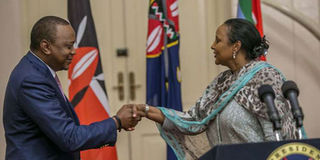Yes, women are rising and need support to transform the world

President Uhuru Kenyatta congratulates Amina Mohamed at State House, Nairobi, on October 3, 2016 on her nomination for the position of African Union chairperson. PHOTO | NATION MEDIA GROUP
What you need to know:
- Speaking of the UN, the Guardian reported earlier in the year that among the 12 people most likely to succeed Mr Ban Ki-moon, more than half were women.
- In short, if we are to have a realistic chance at reducing poverty, we must find ways of reducing income inequality between men and women.
Helmut Newton did not give up his passion for fashion photography even when he was an elderly man.
Over the many years of his colourful career, he built a reputation for his bold black-and-white images that graced the covers of leading magazines.
Although in many of his pictures women posed in their natural suits, Newton believed that he was showing their strength.
“I am a partisan for women,” he said in a documentary about his life and work. “You cannot photograph women unless you love them.”
Though he spoke these words many years ago, he could as well have been speaking for all men — and women — of our time who are partisans for women.
Indeed, this is an exciting time for women, both at home and abroad.
More than ever before, there is a growing number of them seeking leadership positions and knocking on the door of history, what with Hillary Clinton so determined to break the glass ceiling in her quest to become the first woman president of the United States.
Closer home, Foreign Affairs Cabinet Secretary Amina Mohamed has been nominated for the post of chairman of the African Union Commission.
Of the four candidates contending for the job, three are women.
If Ms Mohamed gets the job, it means she would be working with national leaders across Africa and would be in a position to help shape the destiny of many in the continent if she could get the presidents and their men to put the interests of their citizens ahead of their own.
It also means that she would be in a position that would prepare her to make a stab at being the UN Secretary-General in the not-so-distant future.
Speaking of the UN, the Guardian reported earlier in the year that among the 12 people most likely to succeed Mr Ban Ki-moon, more than half were women.
PROPITIOUS TREND
It would appear that women are no longer shy to stake their claim to the top of the leadership hierarchy, even on the global stage.
And from the look of things, women everywhere are not about to run short of role models.
In the heated campaigns for the democratic party nominations that pitted Barack Obama against Mrs Clinton, the African-American poet, Maya Angelou, said that she was facing a serious crisis.
She was a black woman who believed in the cause of black people. Yet, she also fought for the recognition of women.
Maya said that she had a difficult time deciding who to support between Obama and Clinton.
In the end, the decision was made for her. Sadly, she is not alive today to see that Hillary Clinton stands a real chance of becoming president and the most powerful woman in the world.
Although there are those who will squirm at the prospect of women becoming more active in the political and economic sphere, there is much to be said for the empowerment of women.
As Judge Roselyn Nambuye said when she was interviewed for the post of Deputy Chief Justice, gone are the days when women were “joyriders in marriages”.
In a sense, she was saying that women need not be spectators in the economy.
They, too, have a place at the economic and leadership table, and as author Sheryl Sandberg said, they should be ready to “lean in” and make their presence felt.
Although scientists and economists have repeatedly shown that educating women and giving them an opportunity to grow their incomes is good for the family’s wellbeing, this idea is yet to take root.
Even when we have been taught that this will improve the wellbeing of children now and in their adulthood, it still does not register.
Interestingly, a report published in Time magazine last month showed that being the main bread winner in the family is actually good for women... and counterproductive for men.
So, why do we persist in the old ways of doing things?
Thankfully, the rise of women in leadership in recent times has been greeted with optimism.
MOTIVATE THEM
Despite the fears that men are losing their place as the dominant players in the family, business and politics, there is something sunny and edifying when women become winners and achievers.
For instance, it has been found that educating and empowering ordinary women reduces poverty.
According to a World Bank report released this week, 385 million children are living in poverty globally, many of them in developing countries.
What this means is that the map of poorly educated women also corresponds with that of children living in poverty.
In short, if we are to have a realistic chance at reducing poverty, we must find ways of reducing income inequality between men and women.
One way of doing this is by encouraging more women to stay longer in school and take up leadership.
Mr Mbugua is the deputy managing editor of the Daily Nation. [email protected]





